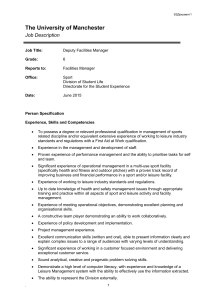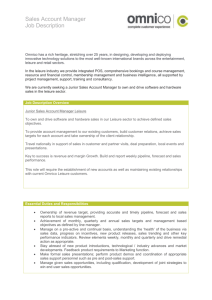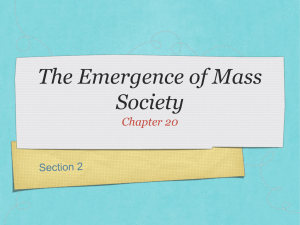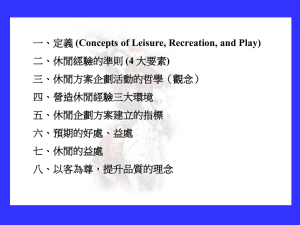File - Svitlana Iarmolenko
advertisement
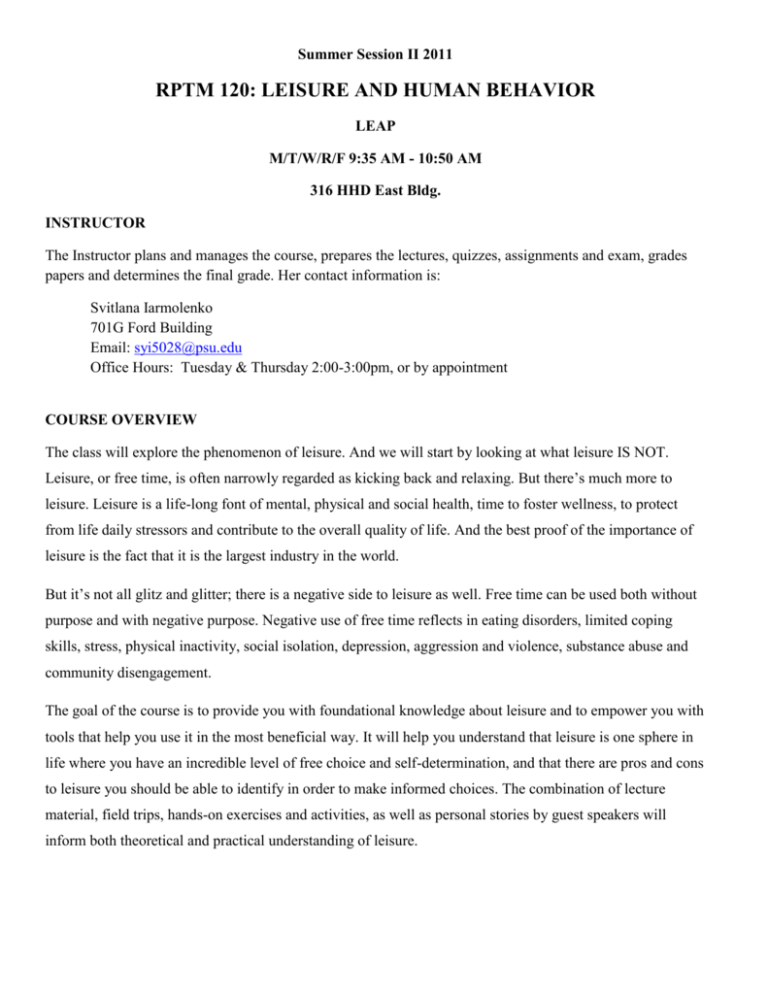
Summer Session II 2011 RPTM 120: LEISURE AND HUMAN BEHAVIOR LEAP M/T/W/R/F 9:35 AM - 10:50 AM 316 HHD East Bldg. INSTRUCTOR The Instructor plans and manages the course, prepares the lectures, quizzes, assignments and exam, grades papers and determines the final grade. Her contact information is: Svitlana Iarmolenko 701G Ford Building Email: syi5028@psu.edu Office Hours: Tuesday & Thursday 2:00-3:00pm, or by appointment COURSE OVERVIEW The class will explore the phenomenon of leisure. And we will start by looking at what leisure IS NOT. Leisure, or free time, is often narrowly regarded as kicking back and relaxing. But there’s much more to leisure. Leisure is a life-long font of mental, physical and social health, time to foster wellness, to protect from life daily stressors and contribute to the overall quality of life. And the best proof of the importance of leisure is the fact that it is the largest industry in the world. But it’s not all glitz and glitter; there is a negative side to leisure as well. Free time can be used both without purpose and with negative purpose. Negative use of free time reflects in eating disorders, limited coping skills, stress, physical inactivity, social isolation, depression, aggression and violence, substance abuse and community disengagement. The goal of the course is to provide you with foundational knowledge about leisure and to empower you with tools that help you use it in the most beneficial way. It will help you understand that leisure is one sphere in life where you have an incredible level of free choice and self-determination, and that there are pros and cons to leisure you should be able to identify in order to make informed choices. The combination of lecture material, field trips, hands-on exercises and activities, as well as personal stories by guest speakers will inform both theoretical and practical understanding of leisure. COURSE GOALS 1. 2. 3. 4. 5. To develop foundational knowledge about leisure To research and critique the role of leisure in one’s daily life To validate the importance of leisure to health To support the contribution of leisure to human development across the lifespan To construct a personal philosophy of leisure COURSE OBJECTIVES After completing RPTM120, students will be able to: 1. List, describe, and critique the characteristics of leisure, recreation, play, flow, and microflow 2. List, describe, and critique the characteristics of leisure specialization, serious leisure, and constraints to leisure 3. Describe the distinguishing features of work and how they differ from those of leisure 4. Describe how leisure in pre-industrial and industrial societies differs from leisure in post-industrial societies. 5. Explain the role of leisure in generating positive and negative emotions 6. Explain links between leisure, coping, and stress reduction 7. Explain linkages between leisure and health 8. Explain links between leisure time use and addictive behavior 9. Evaluate the costs and benefits of positive and negative use of leisure time 10. Summarize and critique personal leisure skills 11. Describe and critique forms of leisure expression such as games and sport, art, tourism 12. Question assumptions about gender and leisure activity 13. Challenge assumptions about sexuality and leisure activity 14. Compare and contrast leisure time use in the US with leisure time in developing and under-developed counties 15. Use the knowledge, skill, and values learned from course exercises to construct personal philosophy of leisure and determine its place in one’s lifestyle 16. Explain linkages between leisure and development 17. Advocate for the contribution of leisure to healthy lifestyles and healthy communities. 18. Understand the process and benefits of volunteering COURSE OUTLINE, CONTENT, AND READING ASSIGNMENTS COURSE OUTLINE AND READING ASSIGNMENTS DATE June 26 Wednesday TOPIC Class goals and objectives, procedures, and introductions. Leisure READING/ ASSIGNMENT Read “US Workers feel burn of Long Hours” in today’s society. Leisure free-list. June 27 Thursday Concept of Leisure. Results of free-list Read “What Is Leisure?” June 28 Friday Concept of Recreation. Activity assignment introduced. July 1 Monday Concept of Play (1) July 2 Tuesday Concept of Play (2). In-class Exercise 1. July 3 Wednesday Concepts of Flow and Microflow. Specialization in Leisure. July 4 Thursday NO CLASS. INDEPENDENCE DAY. July 5 Friday NO CLASS. WORK ON RP1. July 8 Monday Serious and Casual Leisure. Constraints to Leisure Participation. Read “What is Recreation” Activity Paper 1 assigned Read What is Play (Brown Ch. 2) & We are Built for Play (Brown Ch. 3) Read “Playtime Helps Bind Generations” Read “Does Play Have a Dark Side?” (Brown Ch. 7) Read “In the Zone” &“Finding Flow” “Recreation Specialization revisited” Reflection Paper 1 Assigned. Quiz 1 Assigned. Read “No Pain no Gain” & “Freedom to Choose Leisure Activities”, In-class Exercise 2. July 9 Tuesday Exam 1 on Part I. July 10 Wednesday Leisure Through The Ages (1) July 11 Thursday Leisure Through The Ages (2) July 12 Friday Leisure and Healthy Communities. Community Activity. July 15 Monday Work and How it Differs from Leisure. Time Deepening & Famine. Read “Dancing: recreation or ritual” & “Olympic Spirit Then and Now” Activity Paper 2 Assigned Read “Volunteering: Good for You and Good for the Daily Job” July 16 Tuesday Taboo Recreation. Leisure and Addiction. July 17 Wednesday Leisure, Stress and Coping. July 18 Thursday Leisure, Stress and Coping. In-class Exercise 3. July 19 Friday Art as Leisure Expression. Field Trip. July 22 Monday Exam 2 on Part II. July 23 Tuesday Gender and Leisure Activity. Sexuality and Leisure Activity. July 24 Wednesday Quiz 2 Assigned. Read “Alcohol’s Damaging Effects on Brain”. Listen #1 Party School Read “Effects of Stress Can be Inherited” Read “Brain is Co-conspirator in a vicious stress loop” Activity Paper 3 Assigned. Read “Men Enjoy Half an Hour More Leisure a Day” “Leisure and Sexuality” Games and Sports as Leisure Expression. July 25 Thursday Tourism as Leisure Expression (1) July 26 Friday Tourism as Leisure Expression (2). Reflection Paper 2 Assigned. Read “Tourism in the Third Millennium” Read “Why We Travel” In-class Exercise 4. Read “Social Learning” July 29 Monday Leisure and Social Networks. July 30 Tuesday Leisure and Cultural Diversity July 31 Wednesday Leisure and Positive Emotions (1) Read “The Science of Happiness’ August 1 Thursday Leisure and Positive Emotions (2) August 2 Friday Leisure and Human Development. Read “Experiences Make Us Happier than Possessions” Quiz 3 Assigned. Read “A Generation’s Vanity, Heard Through Lyrics” In-class Exercise 5. August 5 Monday Leisure and Health (1). August 6 Tuesday Leisure and Health (2). August 7 Wednesday Leisure and Health (3). Exam 3 Tips. August 9 Friday Exam 3 on Part III. Read “Fat Mum Fastens Path to Child Obesity” ANGEL (https://cms.psu.edu/section/default.asp) Class Syllabus, required readings, quizzes and instructions for assignments will be posted on ANGEL. Important class dates and announcements will be distributed through ANGEL mail utility. READINGS Required reading assignments are listed in the Syllabus. Most of the required readings are posted on ANGEL in the folder “Required Readings”. In addition, you will need to refer to the book: Play: How it shapes the brain, opens the imagination and invigorates the soul. Brown, S., & Vaughan, C. (2009). Penguin Publishers. You are welcome to get the book, but are not required to. I will be posting excerpts from it on ANGEL. GRADING CRITERIA Grading for RPTM120 will be based on the following assignments Assignment % of final grade Total % Exams 3 @ 10% 30% Reflection Papers 2 @ 15% 30% Activity Papers 3 @ 5% 15% Quizzes on Required Reading In-class exercises TOTAL 3@ 5% 5@ 2% 15% 10% 100% Exams. The exams will be scheduled throughout the semester with the last exam taking place during the Final Exam day for Summer Session 2 according to the University Academic Calendar. Each exam will cover the material in the class covered up to that point, and constitute 10% of the grade for a total of 30% for three exams. Failing to take the exam at the appointed time will result in a zero being assigned for the exam unless 1) prearranged with instructor, 2) resulting from a University Sanctioned excuse. Reflection Papers. During the course of the semester you will be required to write two Reflection Papers in times scheduled in the syllabus. Reflection papers will show your considerations of class concepts and their application in daily life, and will be graded on completeness, understanding of class concepts, depth of thought, and how they are written and formatted. For late submissions of the paper, 2 points will be deducted for every 24 hour period it is late. If a make-up paper is assigned, it must be completed within a week of the assigned Reflection Paper. Activity Papers require you to engage in a new activity. You will attempt THE SAME ACTIVITY at least three times over the course of the semester. You are required to complete three (3) Activity Papers during the semester. Activity Papers require photo documentation along with the paper. Please make sure that you plan accordingly. Activity Papers will be graded on completeness, perceived effort, understanding of class concepts, and depth of thought. If the Activity Paper is turned in late, two points are deducted for every 24-hour period it is late. Quizzes. The three Quizzes for the course will be posted on ANGEL and based on the Required Readings. They will be available for a limited time and once the Quiz closes on ANGEL, there is no make-up unless student provides a University Sanctioned excuse. If the make-up Quiz is allowed, it has to be completed within three days of assigned date of the original Quiz. In-class Exercises and Activities. Some weeks in class there will be either an individual or group exercise, or a field trip/community activity. Students are expected to attend and actively participate, as subsequent assignments will depend on participation in field trip/community activity. In-class exercises will be turned in and graded for credit. Extra Credit. At instructor’s discretion, there might be an opportunity for extra credit work during the semester. GRADING All of the final grades issued in RPTM 120 are based on the percentage s shown in the table. Grading Scale. Letter Grade % Range A 93.5+ A89.5-93.4 B+ 87.5-89.4 B 83.5-87.4 B79.5-83.4 C+ 77.5-79.4 C 69.5-77.4 D 59.5- 69.4 F 59.4-0.0 LECTURE ATTENDANCE, EFFORT, ATTITUDE, AND PARTICIPATION The Instructor will not take attendance, but it is highly recommended that you come to every class, as lecture notes will not be distributed through ANGEL. Information provided by guest speakers can only be heard in class and will not be summarized for those who were absent. Directions for assignments will be expanded in class and not repeated outside class. Additionally, attendance of the field trip and community event is a part of the class credit and will provide you with information for Response Papers. Without attending, you will lose both credit for an activity and a paper. I expect you to attend every class. I will be glad to see you every class and will be courteous to you. I expect the same from you. COURSE ACADEMIC INTEGRITY POLICY Faculty Senate Policy 49-20 (Academic Integrity) Definition and expectations: Academic integrity is the pursuit of scholarly activity in an open, honest and responsible manner. Academic integrity is a basic guiding principle for all academic activity at The Pennsylvania State University, and all members of the University community are expected to act in accordance with this principle. Consistent with this expectation, the University's Code of Conduct states that all students should act with personal integrity, respect other students' dignity, rights and property, and help create and maintain an environment in which all can succeed through the fruits of their efforts. Academic integrity includes a commitment by all members of the University community not to engage in or tolerate acts of falsification, misrepresentation or deception. Such acts of dishonesty violate the fundamental ethical principles of the University community and compromise the worth of work completed by others. Violations of Academic Integrity will be handled in accordance with procedures (see http://www.psu.edu/dept/oue/aappm/G-9.html) and policies (see http://www.psu.edu/dept/ufs/policies/47-00.html#4920). In accordance with PSU procedures (http://www.psu.edu/dept/oue/aappm/G-9.html), students found in violation of academic integrity policies will be referred to the Office of Judicial Affairs and may receive a failing grade for the class or a reduction of grade. LEARNING DISABILITIES. Penn State welcomes students with disabilities into the University’s educational programs. If you have a disabilityrelated need for reasonable academic adjustments in this course, contact the Office for Disability Services (ODS): http://www.equity.psu.edu/ods, 116 Boucke Building, or 1-814-863-1807 (V/TTY). For further information regarding ODS please visit their web site. The instructors should be notified as early in the semester as possible regarding any need for academic adjustments. CLASSROOM CONDUCT Faculty Senate Policy AD62 (Scheduling and Use of General Purpose Classrooms) stipulates that the college, department or individual scheduling use of the room is responsible and will receive direct billing for the assessment and repair of any damage or negligent or intentional damage attributed to room use, as well as janitorial and maintenance costs attributed to unauthorized food and drink use. Water is the only beverage allowed in the classroom. We encourage students to reuse and recycle their empty water bottles. RESOLUTION OF CLASSROOM PROBLEMS Faculty Senate Policy 20-00 (Resolution of Classroom Problems). Students having concerns about situations that arise within the classroom , or concerns with instructor behavior in a course that violates University Standards of classroom conduct as defined in Policy HR64 “Academic Freedom”, may seek resolution according to the recommended procedures established under Policy 20-00, Resolution of Classroom Problems. In every case, student concerns arising from questions about classroom situations or behavior shall be resolved in a manner that provides for equity and due process for students and for instructors. Students may attempt to resolve classroom problems with assurance that confidentiality will be maintained as appropriate.

